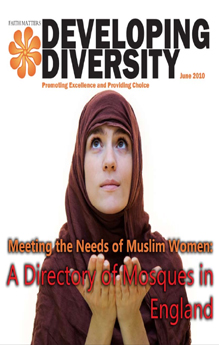
Publisher: Faith Matters
Release Date: June 2010
Pages: 136
Source: https://www.faith-matters.org/2010/06/10/mores-news-on-developing-diversity/
This report identifies mosques in the UK that have made efforts to meet the needs of women and seek their engagement in mosque affairs. Drawing on the findings from focus groups, five aspects of mosque services formed the basis for the assessment: separate prayer space for women; services and activities for women (e.g. childcare); an imam or qualified woman accessible to service users; inclusion of women in decision-making (at operational and strategic levels); women holding office in mosque committees. Mosques that could be ‘ticked off’ on all aspects were assigned ‘five stars’. The authors note: “fifty eight five star mosques and sixty four four star mosques were assessed via the telephone and each of the five star mosques were visited in person across England so that face to face validation work could be undertaken….a final number of fifty five star and fifty four star mosques were therefore included in this directory…[it] is therefore a snapshot of service provision between February and March 2010”.
The ‘five star’ mosques’ geographical distribution is as follows (starting with the connurbation with the greatest number):
London – East 7
London – North 6
Birmingham 4
London – North West 4
Bradford 3
London – South East 3
London – West 3
London – South West 2
Manchester 2
Nottingham 2
Peterborough 2
Rochdale 2
Stoke on Trent 2
Surrey 2
Basildon 1
Bolton 1
Brighton 1
Exeter 1
Leicester 1
London – Central 1
Oldham 1
Southampton 1
Wakefield 1
The list includes all the main mosques in London – Baker Street, London Muslim Centre, Al-Manar, Al-Muntada. The lower number from regions of high Muslim population such as Bradford, Leicester and Birmingham requires further study. In any case there is at least one potential role model mosque in these cities.
The study was undertaken by Faith Works, based on Government’s Prevent monies. It had been allocated £75,000 of CLG funding in 2008/2009 for compiling “a directory of the 100 leading mosques that provide the best access to women…the ultimate aim is to incentivise mosques to improve their engagement with and inclusion of women in all aspects of their work through greater access to recognition and resources from the public sector”.
Projects funded by Prevent have been controversial and widely perceived within the community as efforts to reshape theological aspects and embark on top-down social engineering. The performance of projects are audited using a central government-specified assessment form, the NI35, which makes explicit reference to women’s issues: “Building the capabilities of Muslim communities, including young people and women to provide positive leadership to local communities and confidence to challenge extremism”. Many canny, clever consultancies have benefited from the Prevent largesse by playing on such funding criteria. ‘Meeting the needs of Muslim women’ should not remain an academic exercise, but the champions for change need to emerge from within mosques and local communities, rather than on high.
